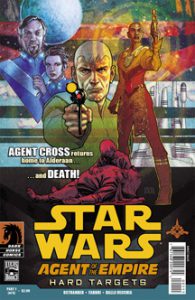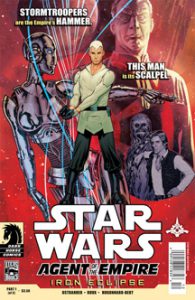One of the most all-around beautiful pieces of “Star Wars” comic storytelling came toward the end of the Dark Horse run: “Agent of the Empire,” which includes the five-issue arcs “Iron Eclipse” (2011-12) and “Hard Targets” (2012-13). The series is written by elite scribe John Ostrander with gorgeous art by Stephane Roux and Stephane Crety (“Iron Eclipse”) and Davide Fabbri and Christian Dalla Vecchia (“Hard Targets”). The latter duo delivered crisp and colorful art on “Republic” and “Empire,” but colorist Wes Dzioba smartly selects darker hues here to fit the mood.
Main character Jahan Cross is purposefully carved from the James Bond mold – complete with designers of cutting-edge weapons, gadgets and vehicles whom he leans on — and he translates well to the era when the Empire is at its height, a few years before “A New Hope.” Although he has Bond-like coolness, charisma and a way with the ladies, Cross feels like a genuine “Star Wars” character for a couple reasons.
One, it makes sense that the Imperial bureaucracy would employ someone like him, who does off-the-books missions, reporting to head of Intelligence Armand Isard (introduced in the “X-wing” novels). Aside from being much further removed from the Emperor (who possibly doesn’t know he exists), Cross is like Mara Jade in her Emperor’s Hand days. Even though they are Imperials, we root for them when they take down corrupt Imperial officers, as Cross does in the opening panels.
Two, Cross interacts naturally with familiar characters and locales. In addition to Isard, there’s also Han and Chewbacca, who play a bigger-than-a-cameo role in “Iron Eclipse,” which is set in the Corporate Sector. (This leads me to fondly remember Brian Daley’s novels and wish the spirt of those yarns was captured in more stories.) I like how Han tells a companion that jumping out of gravity well would tear the Falcon apart – rules that don’t apply in the Disney universe (as “The Force Awakens” shows), just one example of why the EU feels more grounded and real.

In “Hard Targets,” the Alderaanian Cross naturally crosses paths with Bail Organa and Princess Leia. It would’ve been interesting to see Cross’s reaction to the Empire’s destruction of Alderaan, but of course “Agent of the Empire” ends short of that point. Boba Fett plays into the second arc, too, and he casually references a previous showdown with Cross on The Wheel (a location from the Marvel comics, although that particular meeting is never chronicled).
I like how we see a helmet-less Boba Fett here, with Fabbri and Dalla Vecchia giving him a very human grizzled look that belies his professionalism. We also catch up with the royal Dooku line of Serenno, and the art team repurposes the wonderful production design of “The Phantom Menace” for a more energetic underwater chase.
A kinetic-yet-graspable series, “Agent of the Empire” smoothly fits into “Star Wars” lore for all of the above reasons, yet Ostrander never seems to be showing off his knowledge of the wider continuity.

As distant as he may be, and as much as he might be an agent of the plot, Cross gradually builds into a character over the course of these 10 issues. The impression (which may or may not be fair) I get from James Bond stories is that the action comes before characterization. Those movies are a bunch of entertaining moments that don’t add up to a satisfying package, because the plots are often convoluted and because Bond’s relationships and loyalties are so fleeting.
That carries over to “Agent of the Empire” – at first blush. Cross is not precisely a womanizer, but when a sexy Nautolan companion is killed amid his mission (and as part of a scheme to take down our protagonist), Cross is not thrown off his game. When he bonds with human femme fatale Elli Stark at the end of “Iron Eclipse,” he notes that she’d be great marriage material for someone. “But you’re not interested,” she says. “Well, I didn’t say that,” he quips. They kiss, the story ends, and of course she’s not mentioned in “Hard Targets,” by which time I – like Cross – had forgotten her name.
In flashbacks, Ostrander shows us why Cross becomes an Imperial agent: He believes the official history that the Jedi took down the Republic, and he thinks emphasizing “order” is the best response. Or at least he tells himself that. Really, he becomes cold to the galaxy after his family is killed in the chaos following the crash of the Invisible Hand on Coruscant at the start of “Revenge of the Sith.”
Like a better take on the “New Rebellion” plot, the superweapon of “Iron Eclipse” is a computer virus that can control all droids. He allows his virus-corrupted human-replica droid IN-GA to perish, even though she’s the closest thing he has too a friend (and perhaps he leaves her synth-flesh off so as not to grow too close). His reasoning: “No one should have that (weapon). Not even the Empire. It would be chaos.” So while I disagree with his politics, there’s evidence that Cross is not all in with his employers, and had the series gone further, I think he might’ve gone firmly rogue.
We’ll never know, but EU fans should treasure “Agent of the Empire” as a brilliant example of Ostrander tying together various elements of the saga into a slick story that also fleshes out the pre-Rebellion era.

